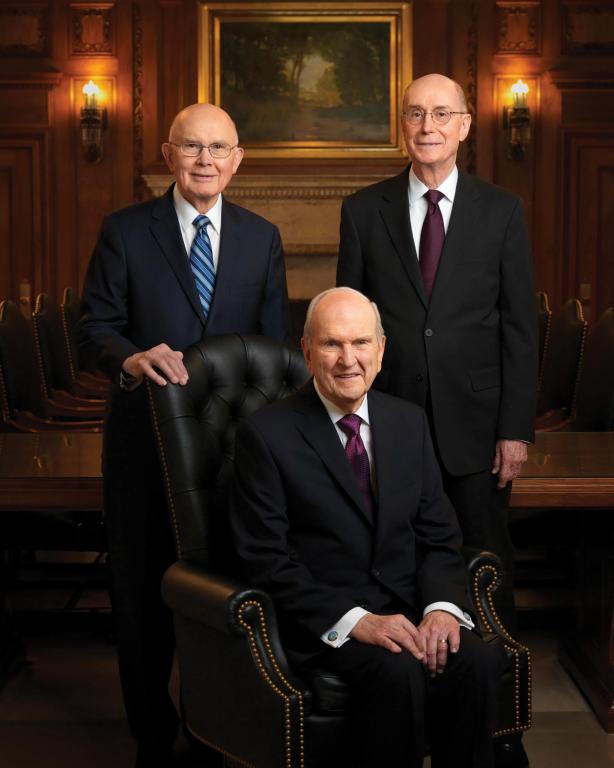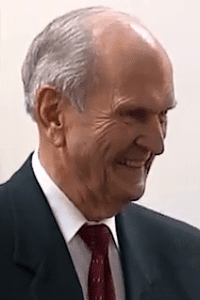
Elder Russell M. Nelson was set apart as the seventeenth president of the Church of Jesus Christ of Latter-day Saints on 14 January 2018 — which means that this past Saturday marked his fifth anniversary as the leader of the Church. Here are some interesting retrospectives on his tenure in office:
- “A Look at President Russell M. Nelson’s 5-Year Prophetic Ministry: Leadership, revelation and invitations from the 17th Prophet and President of the Church of Jesus Christ, set apart on January 14, 2018”
- “15 Experiences of People Who Followed President Nelson’s Invitations: Latter-day Saints share experiences of following invitations to focus on the temple, take charge of their testimonies and more”
- “First five years: Memorable quotes and teachings from President Russell M. Nelson: His ministry has helped the world through a global pandemic, natural disasters and racial unrest by focusing all on Christ”

(Wikimedia Commons public domain image)
In honor of the focus of this year’s “Come, Follow Me” lessons on the New Testament, I’ve pulled down a book that I’ve had on my shelf for several years but haven’t yet read: Craig S. Keener, The Historical Jesus of the Gospels (Grand Rapids, MI: Wm. B. Eerdmans Publishing, 2009). It’s quite large — xxxiii + 831 pages — and I guess I’ve been intimidated by its sheer bulk. But I’m going to read it through over the next weeks, a little bit each day. Here, in fact, are some passages from the Introduction that I marked earlier today. Professor Keener is a believing Evangelical (with a Ph.D. in New Testament studies from Duke), but he doesn’t appear to be an inerrantist. Not, anyway, in the rigid sense that I’ve sometimes encountered. Here, for example, he’s talking about differences between the Gospels:
To take one graphic example, whereas Mark (reflecting his Palestinian tradition) reports supplicants digging through a roof to reach Jesus, in Luke they tear off the roof tiles — an image more understandable to Luke’s northern Mediterranean audience. I think it is fair to surmise that those who protest the theological impossibility of such differences have never taken time to honestly and closely compare parallel texts in the Gospels.
For the sake of space, I will not seek to demonstrate such points that are self-evident in the Gospels themselves and barely ever in dispute among biblical scholars. Rather, I will argue instead that such adaptations appear within the acceptable bounds of ancient biography, historiography, and oral tradition. Yet I also wish to emphasize that the Gospels, like comparable ancient works, contain such adaptations in contrast to a novelistic, wholesale creation of events. Because works with historical interest and focused on recent events were expected to report genuine events, but had some flexibility in how they reported them, my focus is largely on events and patterns of teaching rather than on details. The clear evidence for historical tradition in the Gospels (not least being the conspicuous dependence of Luke and Matthew on sources) rules out assigning them to genre category of novel, and thus invites us to explore the ways they used historical tradition where we can test this use. (xxxii-xxxiii)
The assumption, I guess, is that Luke, who was not only a physician but a Gentile who was not an eyewitness of the ministry of Jesus, was unfamiliar with Palestinian (and specifically Galilean) architecture. So, hearing the story of the lowering of the paralytic through the roof of a small dwelling, he pictured what he personally knew, assuming that the house in the story would have looked like the houses with which he was familiar.
Moving on, I might or might not concur with his comment about the passages in Mark and John below, but I myself have never really seen the point of scriptural inerrancy. I do, though, care about essential historical accuracy, which is not exactly the same thing:
One need not argue that the entire text of the Gospels as we have them is accurate; most scholars, in fact (including most conservative ones), will agree with most of [Bart] Ehrman’s major textual decisions (e.g., the inauthenticity of Mk 16:9-20 or Jn 7:53-8:11). Observing that most scholars have not been driven to agnosticism by these textual issues, one scholar suggests that Ehrman’s agnostic response to them reflects his rigidly conservative background; if the text is either completely right or completely wrong, Ehrman’s skepticism is a logical conclusion. Most biblical scholars do not insist on such a forced choice, just as most historians would not. (xxxiii)
Finally, Professor Keener says something about his own background, which I think is helpful for readers to know:
Like all scholars (though I think not more than most scholars), I write with my own presuppositions. For those who are interested in the question, I began my interest in questions about religion and, to a much lesser extent, biblical perspectives from a position of extreme (though not totally closed-minded) skepticism, as an atheist. As one who is now a Christian I approach the subject with a special interest I previously lacked, but an interest that I believe makes me more rather than less committed to investigating genuine historical information about Jesus. When I was an atheist I never imagined that my life would take this turn, but I harbor no regrets that it has. Even when I was an atheist I valued pursuing truth, regardless of where it might lead. (xxxv)

(Provenance of photo unknown, available online)
I was pleased to read about this gathering: “The case for faith-based college education and what other universities can learn: Notre Dame, BYU, Yeshiva University and a host of others come together in Washington to share innovative ideas.” I like the mutually supportive interfaith character of it. I like the fact that Brigham Young University and the Church of Jesus Christ of Latter-day Saints were well represented. But — and I don’t see this as in any way contradictory — I also really like Eboo Patel’s declaration that “There is no diversity without particularity.” That seems to me a really, really important principle. My sense is that many of today’s most vociferous advocates of “diversity” don’t actually value diversity at all — not, at least, diversity of thought or ideas.












